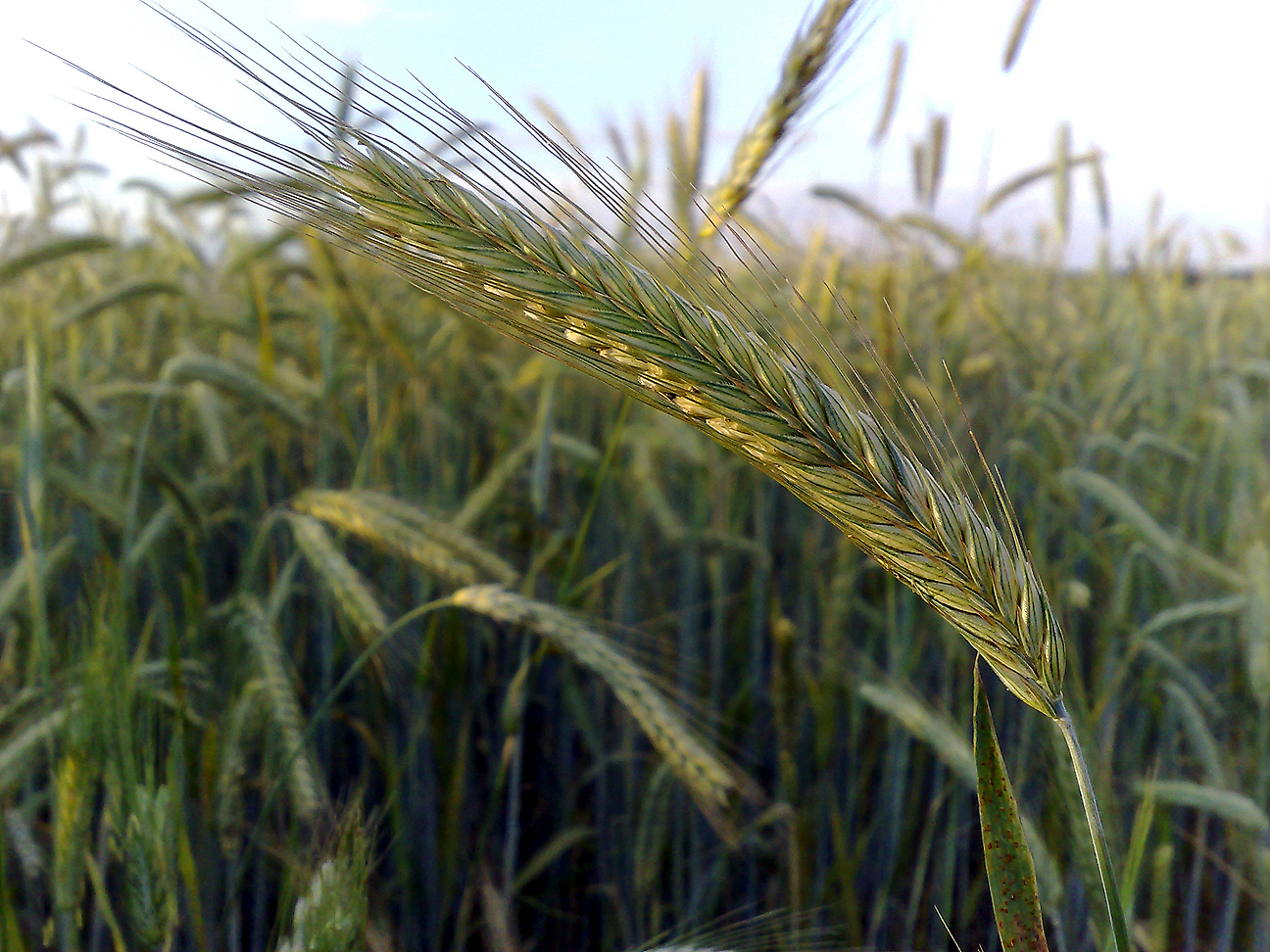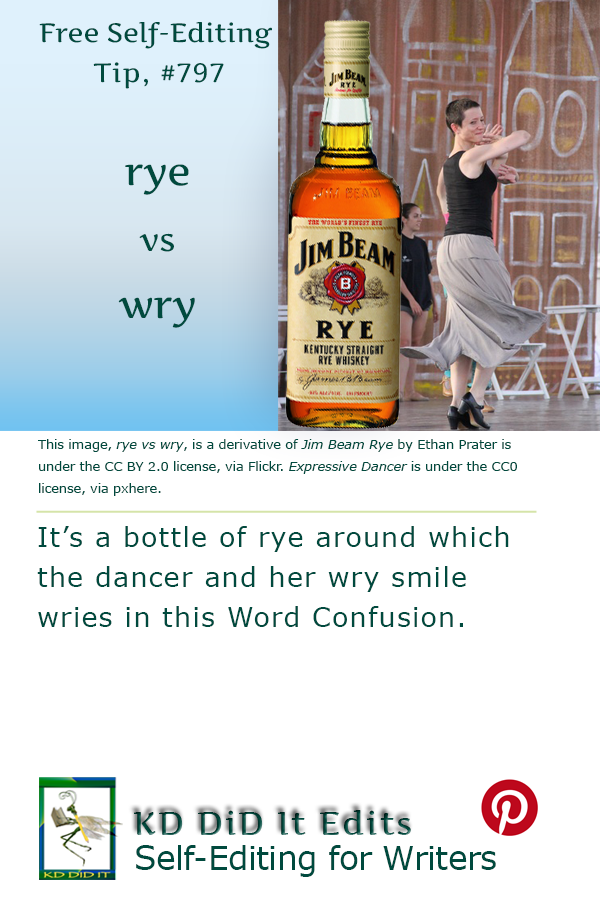Revised as of
27 Dec 2022
Part of the word confusion over rye versus wry is that the pair are heterographs (a subset of homophone).
Rye is generally victuals — food and drink — while wry is a description of appearance or action, that of turning away, deviating, covering.
Word Confusions . . .
. . . started as my way of dealing with a professional frustration with properly spelled words that were out of context in manuscripts I was editing as well as books I was reviewing. It evolved into a sharing of information with y’all. I’m hoping you’ll share with us words that have been a bête noire for you from either end.
If you found this post on “Rye versus Wry” interesting, consider subscribing to KD Did It, if you’d like to track this post for future updates.
| Rye | Wry |
|---|---|

Ear of Rye by LSDSL is under the CC BY-SA 3.0 license, via Wikimedia Commons. |

Wry Smile by Johan A is under the CC BY-SA 2.0 license, via Flickr. |
| Part of Grammar: | |
| Adjective 1; Noun 1, 2
Plural for noun: ryes |
Adjective 1; Verb 2, intransitive & transitive Third person present verb: wries |
| Adjective: Made with rye grain or flour 1 Noun:
[Also rye whiskey] A straight whiskey distilled from a mash containing 51 percent or more rye grain
|
Adjective: Using or expressing dry, especially mocking, humor 1
[Of a person’s face or features] Twisted into an expression of disgust, disappointment, or annoyance [Archaic; of the neck or features] Distorted or turned to one side Devious in course or purpose
Contrary
Distorted or perverted, as in meaning Bend or wind to one side Verb, intransitive:
To turn (away)
Verb, transitive: [Obsolete] To pull out of or as if out of proper shape To divert
[Obsolete] To cover
|
| Examples: | |
| Adjective: Be sure to pick up some rye rolls. Generally, rye whiskey is best with/for cocktails like the Manhattan and old fashioned. You can’t make a proper old fashioned, Sazerac, or Manhattan without rye whiskey. Multi-grain bagels, rye crackers, brown rice, and oatmeal fuel muscles and protect against cancer, diabetes, and heart disease. Noun: Monotony came from the self-sufficiency of small farms; since bread was the staple food, most farms grew wheat, along with other cereals like rye, oat, buckwheat, maize, and barley. Annual cover crops such as vetch, triticale, rye, winter wheat, or Austrian winter peas should be sown in mid-September. A least a bit of rye flour is required to make rye bread. There was a half a bottle of rye left. Ruth ordered four rounds of quadruple ryes, Faulkner ordered four rounds of moonshine. Gimme a pastrami on rye. Titus was getting almost weepy about this when Patrice limped in with the lunch and spread it out on the marble table: hot pastrami on rye, big pickles, pastries, and coffee in white cardboard tubs. He’s a right rye, this one. |
Adjective: She gave a wry smile at the comment on breakfast. Director Peter Evans highlights the play’s wry humour and latent evil with a low-key, ironic spin (Cambridge). He pulled a wry face as he swallowed, setting the cup down on the table again. Aliette made a wry face, and turned away disbelieving. Elizabeth styled him her pygmy; his enemies delighted in vilifying his wry neck, crooked back. and splay foot, and in Bacon’s essay “On Deformity”, it was said, “the world takes notice that he paints out his little cousin to the life.” The term wry-neck or torticollis is applied to a condition in which the head assumes an abnormal attitude, which is usually one of combined lateral flexion and rotation. His tongue-in-cheek comparison of the religious life with the life of a fox-hunting man has a certain wry panache (Cambridge). She had a wry sense of humor. His “revised performances”, created from existing works, often make wry commentaries on the content of the source material (Cambridge). He could be wry and sardonic about the claims of religious faith — but just as wary of metaphysical or ideological faith (Cambridge). Verb, intransitive: “Must murder wives much better than themselves / For wrying but a little!” – Shakespeare. They have wrested and wryed his doctrine.” – Robinson Verb, transitive: “[Wry] you in that mantle.” – Chaucer. |
| Derivatives: | |
| Noun: ryegrass | Adjective: awry, wrier, wriest, wryer, wryest Adverb: wryly Noun: wryness |
| History of the Word: | |
|
|
C’mon, get it out of your system, bitch, whine, moan . . . which words are your pet peeves? Also, please note that I try to be as accurate as I can, but mistakes happen or I miss something. Email me if you find errors, so I can fix them . . . and we’ll all benefit!
Satisfy your curiosity about other Word Confusions on its homepage or more generally explore the index of self-editing posts. You may also want to explore Book Layout & Formatting Ideas, Formatting Tips, Grammar Explanations, Linguistics, Publishing Tips, the Properly Punctuated, Writing Ideas and Resources, and Working Your Website.
Resources for Rye versus Wry
Cambridge English Corpus. <http://www.cambridge.org/gb/cambridgeenglish/better-learning/deeper-insights/linguistics-pedagogy/cambridge-english-corpus>.
Dictionary.com: rye
Merriam-Webster: wry
Webster’s 1913 Dictionary: wry
Wiktionary: wry
Pinterest Photo Credits:
Jim Beam Rye by Ethan Prater is under the CC BY 2.0 license, via Flickr. Expressive Dancer, <https://pxhere.com/fi/photo/868046> is under the CC0 license, via pxhere.


